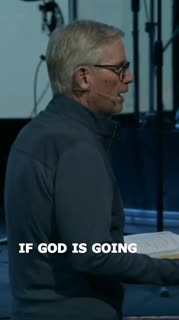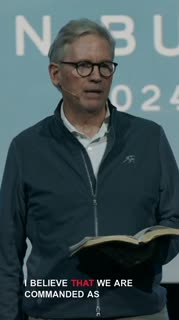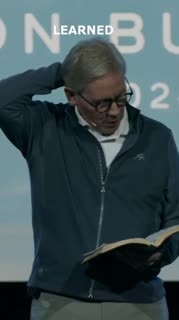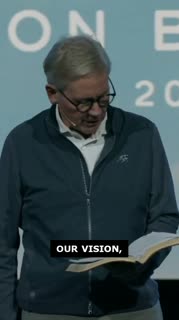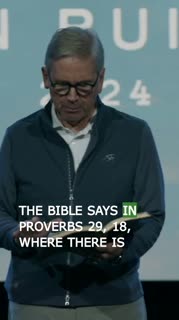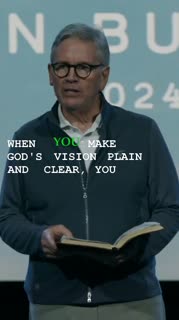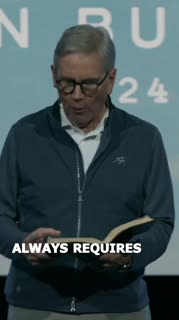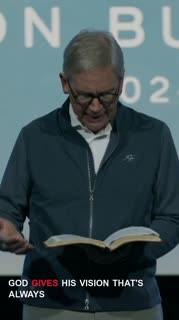Stewarding God's Vision: Faith, Civic Duty, and Patience
Devotional
Sermon Summary
Bible Study Guide
Sermon Clips
1) "If God is going to give you a vision, or if he has given you a vision that requires his provision, that requires him, requires a collaboration, how should you respond? Number one, you realize, recognize you are a steward. You're a servant. So when God gives you a word, when he begins to speak a vision into your life, he begins to show you something about himself. Here's the first stop is, I am a steward of what he's given me. It's not mine, it's his. And when you recognize and realize it's his, then you have no embarrassment about sharing what it is that he wants to do. You just lay it out there." [00:00] (60 seconds)
2) "I believe that we are commanded as Christians to... To vote. To be good citizens. I believe that. I believe that when people think about what good citizens are, that they would find out at the core they're Christ followers. And so I know that some of these things, like, I mean, you know, you think, man, it's hard for me to reconcile voting for this person or that person, this issue or that issue. But I'm just saying that, hey, we as Christians don't have the... We really are people that should be model citizens. And I believe that includes voting." [07:17] (49 seconds)
3) "Here's what I've learned about vision. Most everybody has some kind of vision. So if you're here today, you probably got some kind of vision, a vision for your life, a vision for your family, a vision for your business, your favorite football team. I have this time of year, I always get a vision to see the Cowboys in the Super Bowl. And for 29 years in a row, I've been disappointed. But not every vision that people have is a vision from God. So it's possible to have a human vision. But today, what I want to talk about is a divine vision, a vision that comes from God." [16:25] (44 seconds)
4) "Our vision, this is who we are, is to build a community for God seekers. That every one of you are here today, we believe, because you want more of God in your life. We want to create a community that doesn't hinder that, but a community that makes it fertile for that to happen, for you to get more of God. In your life, for me to have more of God in my life. And so we're building a community for God seekers." [17:56] (28 seconds)
5) "The Bible says in Proverbs 29, 18, where there is no prophetic vision, the people cast off restraint. It's the vision that keeps us together. Now, again, I'm talking about vision that comes from God. The God kind of vision. It's that prophetic revelations, that knowing and understanding who we are, what we do, and why we do it, and then I'm a part of that. That kind of vision is what we're talking about. Where there is no prophetic vision, the Bible says, the people cast off restraint." [21:31] (35 seconds)
6) "When you make God's vision plain and clear, you write it down so people can see it. You talk about it multiple times during the year. You have an event every year where we discuss it. It keeps everybody together, first and foremost. But secondly, it begins to take a life of its own. When you declare God's vision for your small group, for your... for your marriage, for your kids, for your family, for your friends, for your church, and you declare it and get it out there in the airwaves, it begins to take its own life. It begins to take life and become life-giving." [23:29] (43 seconds)
7) "God's vision always requires God's provision. If God gives you a vision, and you got all the money in your bank account you need to make that happen, I'm sorry to tell you this, but it's not from God. It's not from God. God doesn't need your money. But he gives you a vision where you have to have his money to be able to do it. That's just the way he works. That's the way he flows. That's the way he rolls. Right? And so God's vision always requires God's provision." [27:38] (38 seconds)
8) "God gives his vision that's always aligned with his word. It's never different. It's never different from his word. And then we, as collaborators, prepare the soil of our hearts. We get our hearts ready to receive the word. We make sure that we're ready, humble. We're stewards. We're in a spot to say, Lord, this is not me. This is you. I'm a steward of it. Whatever you say is what we'll do. Right? And so we prepare the soil of our hearts and then we sow the seed. What is the seed? It's the word that we got. It's the vision. It's the vision. It's the vision that God has for us." [34:10] (37 seconds)
Ask a question about this sermon
2) "I believe that we are commanded as Christians to... To vote. To be good citizens. I believe that. I believe that when people think about what good citizens are, that they would find out at the core they're Christ followers. And so I know that some of these things, like, I mean, you know, you think, man, it's hard for me to reconcile voting for this person or that person, this issue or that issue. But I'm just saying that, hey, we as Christians don't have the... We really are people that should be model citizens. And I believe that includes voting." [07:17] (49 seconds)
3) "Here's what I've learned about vision. Most everybody has some kind of vision. So if you're here today, you probably got some kind of vision, a vision for your life, a vision for your family, a vision for your business, your favorite football team. I have this time of year, I always get a vision to see the Cowboys in the Super Bowl. And for 29 years in a row, I've been disappointed. But not every vision that people have is a vision from God. So it's possible to have a human vision. But today, what I want to talk about is a divine vision, a vision that comes from God." [16:25] (44 seconds)
4) "Our vision, this is who we are, is to build a community for God seekers. That every one of you are here today, we believe, because you want more of God in your life. We want to create a community that doesn't hinder that, but a community that makes it fertile for that to happen, for you to get more of God. In your life, for me to have more of God in my life. And so we're building a community for God seekers." [17:56] (28 seconds)
5) "The Bible says in Proverbs 29, 18, where there is no prophetic vision, the people cast off restraint. It's the vision that keeps us together. Now, again, I'm talking about vision that comes from God. The God kind of vision. It's that prophetic revelations, that knowing and understanding who we are, what we do, and why we do it, and then I'm a part of that. That kind of vision is what we're talking about. Where there is no prophetic vision, the Bible says, the people cast off restraint." [21:31] (35 seconds)
6) "When you make God's vision plain and clear, you write it down so people can see it. You talk about it multiple times during the year. You have an event every year where we discuss it. It keeps everybody together, first and foremost. But secondly, it begins to take a life of its own. When you declare God's vision for your small group, for your... for your marriage, for your kids, for your family, for your friends, for your church, and you declare it and get it out there in the airwaves, it begins to take its own life. It begins to take life and become life-giving." [23:29] (43 seconds)
7) "God's vision always requires God's provision. If God gives you a vision, and you got all the money in your bank account you need to make that happen, I'm sorry to tell you this, but it's not from God. It's not from God. God doesn't need your money. But he gives you a vision where you have to have his money to be able to do it. That's just the way he works. That's the way he flows. That's the way he rolls. Right? And so God's vision always requires God's provision." [27:38] (38 seconds)
8) "God gives his vision that's always aligned with his word. It's never different. It's never different from his word. And then we, as collaborators, prepare the soil of our hearts. We get our hearts ready to receive the word. We make sure that we're ready, humble. We're stewards. We're in a spot to say, Lord, this is not me. This is you. I'm a steward of it. Whatever you say is what we'll do. Right? And so we prepare the soil of our hearts and then we sow the seed. What is the seed? It's the word that we got. It's the vision. It's the vision. It's the vision that God has for us." [34:10] (37 seconds)
